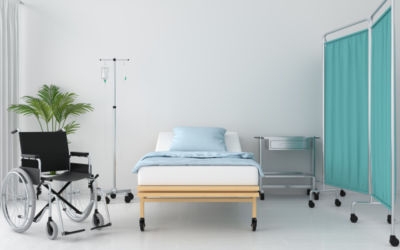Dementia Articles
Preventing Delirium During Hospital Stays

July 9, 2020 | Research
Delirium is defined by the National Institute on Aging as "a state of sudden, acute confusion." The most common occurrence of delirium is during a hospital stay. Individuals who already have dementia are more likely to struggle with delirium. Delirium also can worsen the progression of dementia. For individuals who do not have dementia, having delirium can increase the chance of developing problems with memory and understanding at a later date. It is estimated that 25% of adults who are age 65 or older have delirium while hospitalized for an acute illness or following a surgery. The numbers are even higher for a patient who is in the intensive care unit age 65 or older where delirium happens in 80% of this population.
Preventing delirium is important, because those who suffer from delirium are more likely to have a harder time recovering from an injury or illness. They are also more likely to require going back to the hospital for further care, and are at an increased risk of falling which can all worsen the chances of recovery.
One thing the researchers studied was testing to see if using less sedation medication/anesthesia during a surgery would lessen the rate of delirium. This method did not prove to have a significant impact on the rate of delirium.
The most helpful method to reduce delirium that was found over the course of this study, was several methods described by the Hospital Elder Life Program. These include the following:
- Making sure your loved one has their glasses, hearing aids, or dentures during their hospital stay. Not being able to see or hear correctly can be very disorienting and even worsen confusion that may be felt during a hospital stay.
- Bringing items from home that your loved one will recognize and get comfort from can be helpful. This will make them feel that they are in a comfortable safe place if they see things that are familiar.
- Helping the individual to get up out of the hospital bed and take walks if possible if they are medically able to do so.
- Ensuring that they are eating and drinking to receive the proper nutrition is very important. During a hospital stay, a patient may have different restrictions on what they can eat or drink, so it is important to follow the doctor's order on this. Helping your loved one eat if they require assistance may be helpful as they may be unwilling to eat for hospital staff. Helping your loved one eat may also be helpful as hospital staff are often very busy and may not be able to provide assistance at the exact time that your loved one is hungry or is used to eating.
- Being able to stay with your loved one in their hospital room is calming. Especially for someone with dementia, evenings can be especially difficult to be alone in an unfamiliar place, and can worsen confusion and anxiety.
To read the full article from the National Institute on Aging titled, "Researchers Test New Approaches to Prevent Delirium in Older Adults," click here.
Share this spotlight
Return to the listing of dementia articles.
